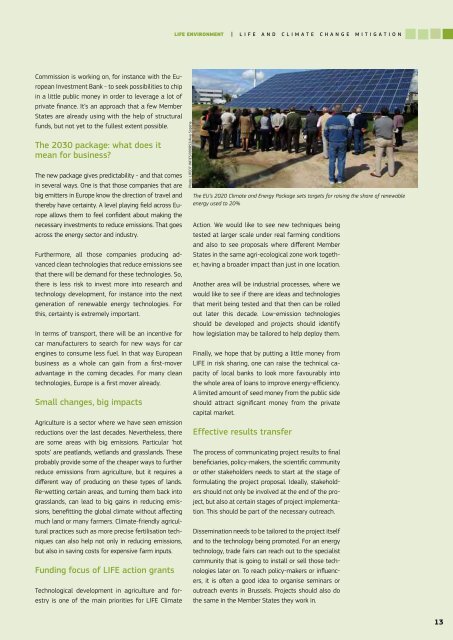You also want an ePaper? Increase the reach of your titles
YUMPU automatically turns print PDFs into web optimized ePapers that Google loves.
LIFE ENVIRONMENT |LIFE and Climate CHANGE mitigationCommission is working on, for instance with the EuropeanInvestment Bank - to seek possibilities to chipin a little public money in order to leverage a lot ofprivate finance. It’s an approach that a few MemberStates are already using with the help of structuralfunds, but not yet to the fullest extent possible.The 2030 package: what does itmean for business?The new package gives predictability - and that comesin several ways. One is that those companies that arebig emitters in Europe know the direction of travel andthereby have certainty. A level playing field across Europeallows them to feel confident about making thenecessary investments to reduce emissions. That goesacross the energy sector and industry.Furthermore, all those companies producing advancedclean technologies that reduce emissions seethat there will be demand for these technologies. So,there is less risk to invest more into research andtechnology development, for instance into the nextgeneration of renewable energy technologies. Forthis, certainty is extremely important.In terms of transport, there will be an incentive forcar manufacturers to search for new ways for carengines to consume less fuel. In that way Europeanbusiness as a whole can gain from a first-moveradvantage in the coming decades. For many cleantechnologies, Europe is a first mover already.Small changes, big impactsAgriculture is a sector where we have seen emissionreductions over the last decades. Nevertheless, thereare some areas with big emissions. Particular ‘hotspots’ are peatlands, wetlands and grasslands. Theseprobably provide some of the cheaper ways to furtherreduce emissions from agriculture, but it requires adifferent way of producing on these types of lands.Re-wetting certain areas, and turning them back intograsslands, can lead to big gains in reducing emissions,benefitting the global climate without affectingmuch land or many farmers. Climate-friendly agriculturalpractices such as more precise fertilisation techniquescan also help not only in reducing emissions,but also in saving costs for expensive farm inputs.Funding focus of LIFE action grantsTechnological development in agriculture and forestryis one of the main priorities for LIFE ClimatePhoto: LIFE07 INF/ES/000852/Aixa SopenaThe EU’s 2020 Climate and Energy Package sets targets for raising the share of renewableenergy used to 20%Action. We would like to see new techniques beingtested at larger scale under real farming conditionsand also to see proposals where different MemberStates in the same agri-ecological zone work together,having a broader impact than just in one location.Another area will be industrial processes, where wewould like to see if there are ideas and technologiesthat merit being tested and that then can be rolledout later this decade. Low-emission technologiesshould be developed and projects should identifyhow legislation may be tailored to help deploy them.Finally, we hope that by putting a little money fromLIFE in risk sharing, one can raise the technical capacityof local banks to look more favourably intothe whole area of loans to improve energy-efficiency.A limited amount of seed money from the public sideshould attract significant money from the privatecapital market.Effective results transferThe process of communicating project results to finalbeneficiaries, policy-makers, the scientific communityor other stakeholders needs to start at the stage offormulating the project proposal. Ideally, stakeholdersshould not only be involved at the end of the project,but also at certain stages of project implementation.This should be part of the necessary outreach.Dissemination needs to be tailored to the project itselfand to the technology being promoted. For an energytechnology, trade fairs can reach out to the specialistcommunity that is going to install or sell those technologieslater on. To reach policy-makers or influencers,it is often a good idea to organise seminars oroutreach events in Brussels. Projects should also dothe same in the Member States they work in.13


